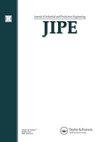非导电陶瓷放电加工中缺陷层的分析
IF 4.6
Q2 ENGINEERING, INDUSTRIAL
引用次数: 0
摘要
本研究的目的是描述一种加工非导电陶瓷的新方法。提出了一种辅助电极放电加工锆陶瓷的方法。对缺陷层,即重铸层和热影响区进行了分析。选取放电电流和脉冲时间两个参数,研究了放电电流和脉冲时间对缺陷层厚度的影响。试验结果表明,增大放电电流和脉冲持续时间,缺陷层厚度增大。这是由于放电能量的增加,使加工区域产生更多的热量。未来的研究可以针对更大数量的测试点进行分析,以了解加工参数与缺陷层厚度之间更好的相关性。本文章由计算机程序翻译,如有差异,请以英文原文为准。
ANALSYS OF DEFECT LAYER IN ELECTRICAL DISCHARGE MACHINING OF NON-CONDUCTIVE CERAMIC
The aim of the research is to describe a new approach for processing non-conductive ceramics. A method of electrical discharge machining with an assisting electrode is presented, which allows the machining of zirconium ceramics. An analysis of the defective layer, i.e., the recast layer and the heat-affected zone, was performed. Two parameters, discharge current and pulse duration, were chosen to study the effects on the thickness of the defect layer. The test results show that increasing the discharge current and pulse duration increases the thickness of the defect layer. This is due to the increase of discharge energy, which causes more heat in the machining zone. Future research can be directed to the analysis of a larger number of test points to see a better dependence between the machining parameters and the thickness of the defect layer.
求助全文
通过发布文献求助,成功后即可免费获取论文全文。
去求助
来源期刊

Journal of Industrial and Production Engineering
ENGINEERING, INDUSTRIAL-
CiteScore
7.50
自引率
6.70%
发文量
21
 求助内容:
求助内容: 应助结果提醒方式:
应助结果提醒方式:


